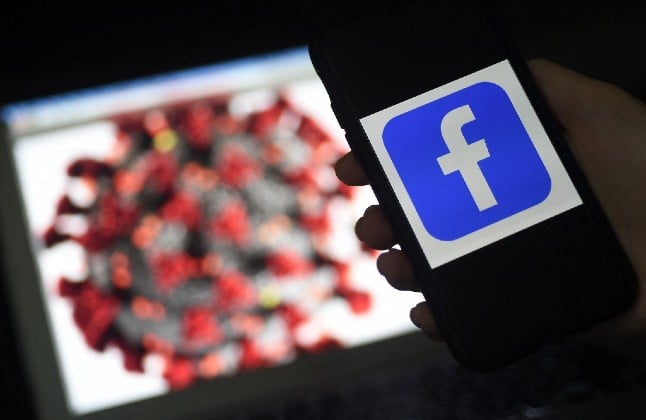- Hundreds protest Covid restrictions in Denmark
- Five arrested after anti-lockdown demo in Danish capital
- Nine arrested in Denmark after violent anti-lockdown demo
PROTEST
Facebook shuts down Danish coronavirus protest group
er Facebook has shut down a Danish group pushing for shops to reopen on Monday in defiance of restrictions after members questioned the value of social distancing.
Published: 14 February 2021 12:23 CET

Facebook has increased its monitoring of groups. Photo: Olivier Douliery/AFP
The group, 'National Reopening on February 15th', had reached close to 10,000 members, many of whom run small shops, hairdressers and beauty salons, by the time Facebook decided to close it down on Friday.
Peter Münster, Facebook's head of communications in the Nordics, said that while protest groups had every right to operate on Facebook, they were not permitted to spread incorrect health information.
“You cannot say that the coronavirus crisis is a hoax or that it does not exist,” he said in a statement. “As soon as there is harmful misinformation which entails a definite health risk for people, we remove it,” he said.
The group's founder, Torkil Poulsen, an entrepreneur from Odense, told the Politiken newspaper after the closure that Facebook had behaved “like a dictatorship”.
But on Sunday he told The Local that Facebook's move had, if anything, helped him publicise Monday's protest.
“I've been doing interviews in all the newspapers, and the radio and the television, so now it's just a question of letting the story run, and we are of course reaping the benefit,” he said.
“I think it will be very big,” he said. “I suppose that there will be over a thousand companies that will open up tomorrow.”
READ ALSO:
Poulsen said that Facebook had justified closing his group by pointing to comments questioning the value of social distancing and hand hygiene, which the social media network had argued went against the advice of the World Health Organisation.
Poulsen said that he was neither sceptical of the existence of coronavirus, or of the effectiveness of such measures.
“I know of course that it works, but we can't live that way,” he said. “You can't live with such distance to people. We have to open up and live in love and peace and not in distance and fear.”
Although he has not himself set up a new Facebook group, several copycat groups have been launched by others promoting Monday's protest.
“We self-employed have had enough of this false pandemic, therefore we will reopen Denmark on 15 February 2021. Restaurants, shops, everything in the whole of Denmark,” one of the new groups says in its description.
Münster told Ritzau that there was nothing to prevent people whose groups had been removed from opening a similar group, although he warned that those new groups would also be removed if they, too, violated the company's guidelines.
“You can't come back with a new, identical group if it still violates the rules, but you can start all over again if you agree to comply with the rules,” he said.
Url copied to clipboard!


 Please whitelist us to continue reading.
Please whitelist us to continue reading.
Member comments